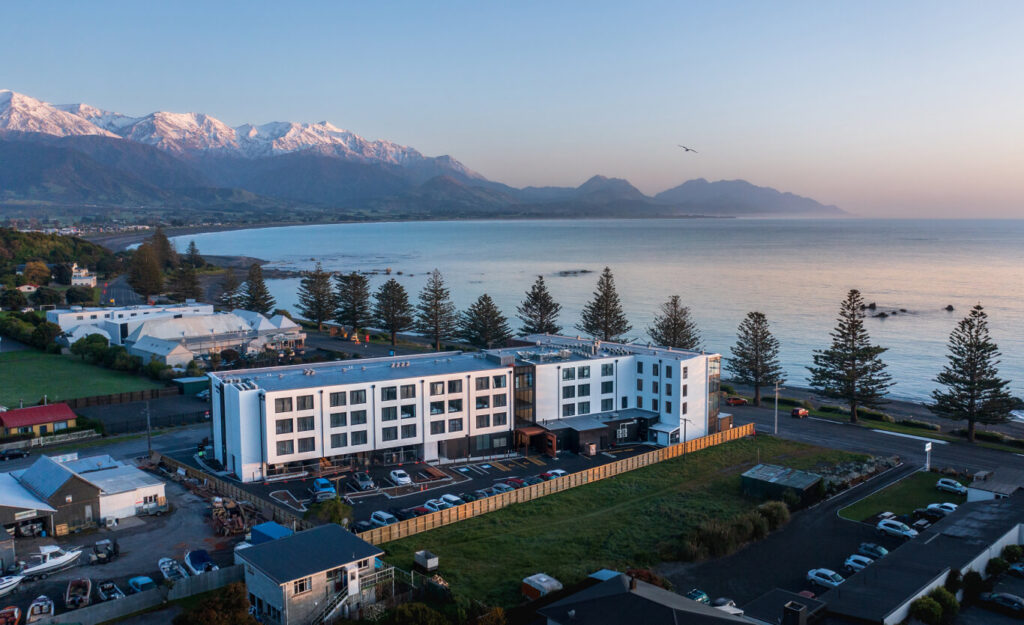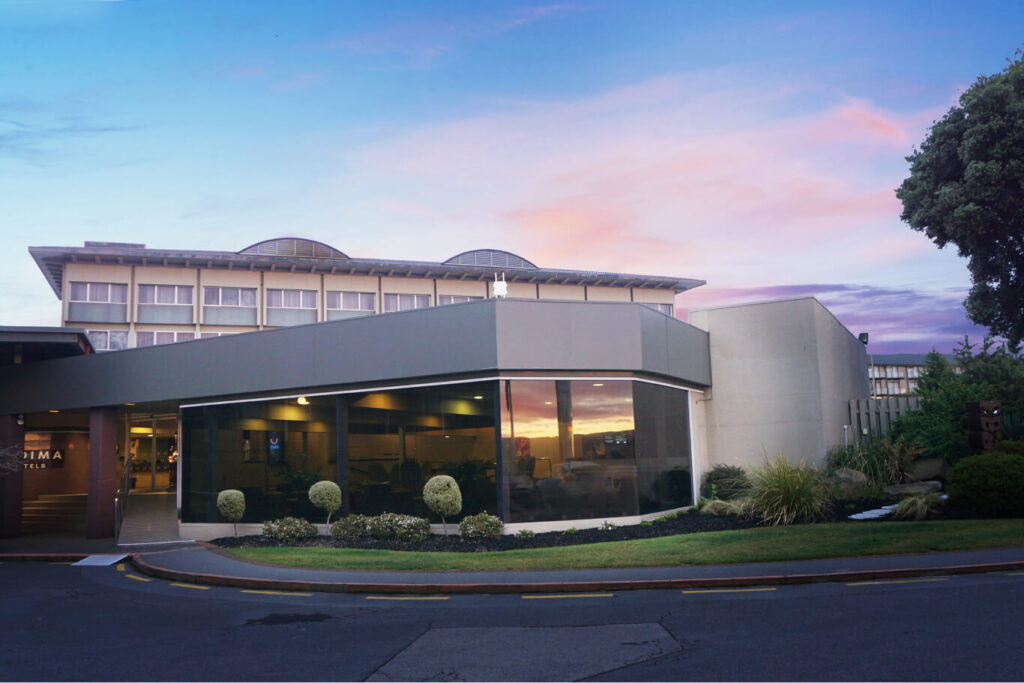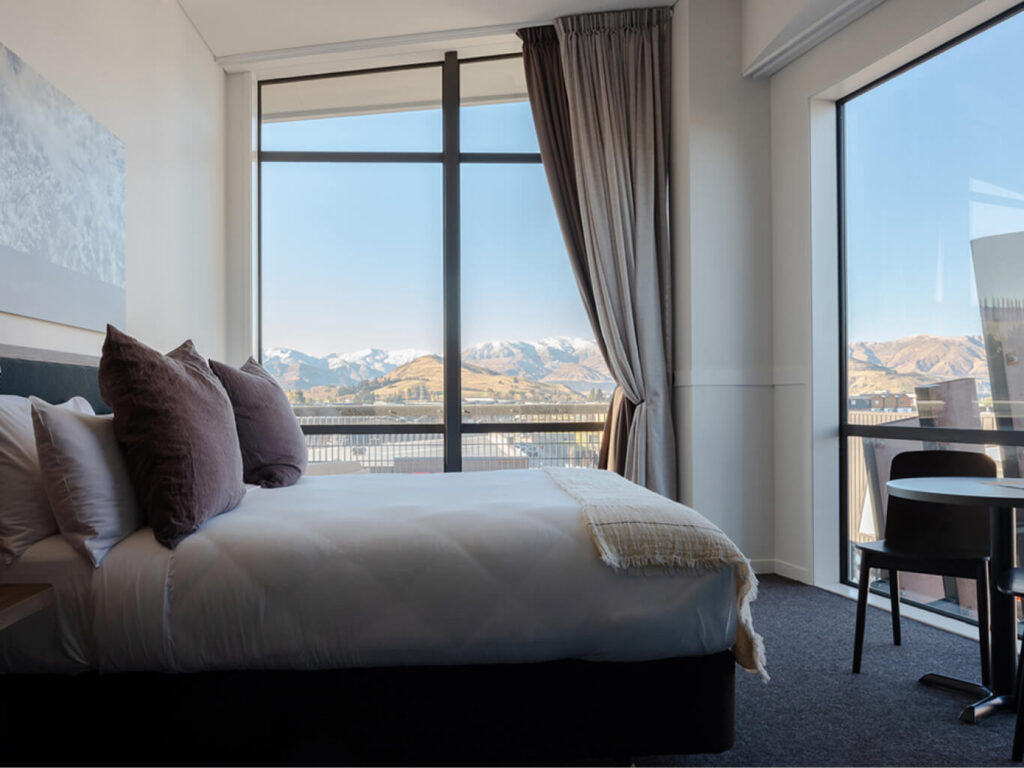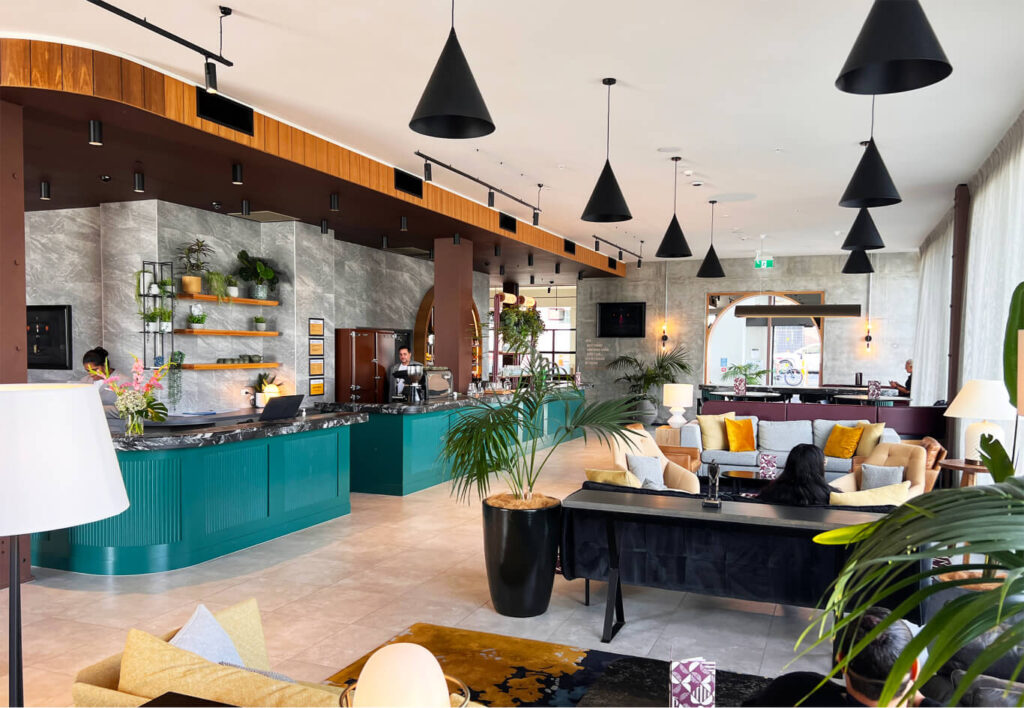“Because technology is developing so fast, people don’t want to wait. They want to arrive, be served quickly, and then go to their room. They want instant results.”
Alena Novikova, Information & Systems Analyst, Sudima Hotels
This post is sponsored by Shiji Group
The Sudima Hotels brand has been operating since 2000 in New Zealand, and its unique approach to building and operating hotels has earned them the distinction of being the only carboNZero certified hotel chain in New Zealand.

Sudima Hotels works with Shiji Group’s POS solution Infrasys Cloud for food and beverage management and ReviewPro to track guest satisfaction across the hotels. In this case study, we’ll look at the role of technology in helping them operate this brand in a modern way that meets guest expectations, reduces time and stress for staff, and enables their mission of sustainability. We spoke with Sudima Hotels Sam Prakasam, IT Infrastructure Manager, and Alena Novikova, Information & Systems Analyst, about what they learned through the process:
About Sudima Hotels
Sudima Hotels is a New Zealand hotel brand committed to providing environmentally friendly, accessible hotels. The brand is owned and led by CEO Sudesh Jhunjhnuwala.
Sudesh started his business career in Hong Kong, working for Sudima Group’s design and OEM watch company. In 2001 he moved to New Zealand to look after the group’s real-estate property portfolio. At this point, he bought the group’s first hotel and started on the journey to create Hind Management and Sudima Hotels.
The brand started as a family business. As they’ve grown they have aimed to retain their friendly, family-focused culture and stay true to their values. “This feeling of genuine warmth and care – for our guests, our staff, our community, and our environment, is what sets us apart,” Sudesh says.
Sudima Hotels’ focus on sustainability informs everything they do. “Our aim is to be carbon neutral and remove all plastics possible from our operation,” Sam added. “Last year we were able to eliminate nearly all single-use plastics and are working with suppliers to remove theirs. We work with suppliers on maximizing sustainability from all the products we purchase. We encourage our suppliers to use things like more sustainable packaging and use wall-mounted refillable dispensers for soap, shampoo, and conditioner in our bathrooms.”
About Sam Prakasam

Sam joined Sudima Hotels 6 years ago to oversee IT and infrastructure operations during a period of rapid growth.
“It was a learning curve for me because I wasn’t familiar with certain parts of hospitality. But I did come with a strong IT background and expertise in operations infrastructure and networking applications from multiple organizations,” Sam said.
“We wanted to set brand standard frameworks and technology to scale, and that opportunity excited me.”
About Alena Novikova

Alena joined Sudima Hotels after hospitality management school as part of its industry placement. Her first role was at a recently-opened Sudima Auckland Airport hotel, and following that had the opportunity to work on the reservations team for the company.
“Working in the front office gave me a great opportunity to learn all the aspects of the hotel operations from the inside out,” Alena recalls. After some time working in these roles, she joined the finance department at Sudima Hotels support office, where she worked for 7 years before her role gradually evolved into Information & Systems Analyst.
“These added experiences allowed me to connect the dots and build a full picture of how the hotel operates. Being directly involved in various systems and software implementations contributed a lot to my understanding of how it all fits together. It also helps to identify the factors at play anytime we’re evaluating a new solution or product because we are able to foresee the potential impacts it may have across our business.”
Limited by legacy technology
Sam, Alena, and the Sudima Hotels team faced a number of challenges as they worked towards a goal of modern infrastructure that would allow the brand to scale.
A need for speed
“People today don’t want to wait,” Alena observed. “They want to arrive at a hotel, get service within a few minutes, and then proceed to their room. They want instant results.”
What creates these expectations? “Guests tend to build their expectations based on previous experiences, be it the other hotels they stay in or cafés and restaurants they went to,” Alena said. “And of course they expect to receive the same level of speed without compromising on the quality of the service.”
Expectations are also shaped by internet culture, Sam added. “Today’s internet and social media culture has been heavily spoiled by instant gratification. This has put a lot of pressure on service industries such as hospitality because people are used to getting things faster. The concept of waiting is almost nonexistent.”
Waiting is no longer a norm but is cause for a complaint. The moment you wait, it becomes a negative part of your stay. We are under this constant pressure of how to improve and provide faster services to keep up with this but without losing the human touch.
Sam Prakasam

Changing staff expectations
These expectations and “internet culture” apply not only to guests but to staff. “Instant gratification was never a thing,” Sam told us. “Your mind was calm and focused. You could be present in any given situation. That level of presence seems rarely possible these days.”
It became apparent that the legacy technology and processes the company previously used would no longer support the pace at which the brand needed to operate.
Building a process to select the right technology partner
While Sam and Alena were convinced a change needed to take place in their technology and were determined to run a process that would help them select the right partners.
“Every vendor that we approached would try to sell us the sun and the moon,” Sam recalled.
The team compiled a list of requirements to help them guide the process.
Shopping criteria
Sudima Hotels’ technology selection process was led by a range of criteria that Sam and Alena knew were vital to their success.
Cloud-based technology
“From the beginning, we knew we couldn’t use an on-premise system,” Sam said.
“We wanted a cloud-based solution because that’s where the world was going. And cloud-based technology also removes the liability of us having to maintain that infrastructure.”
Hardware-agnostic software
Another goal for the Sudima Hotels team was to maximize their options for the future. From Sam’s perspective, it’s important to be hardware agnostic.
“I hate getting locked into one proprietary device. That allows the supplier to charge any amount they’d like to. Because there’s no competition, you have to use that product.”
He uses Telsa Chargers as an example of this. “You have to go to a Tesla charging station to charge a Tesla. That really locks you down. So if they charge more, you have to pay more. Being agnostic gives you the freedom to choose any hardware you want.”
Multi-property support
“We were looking for a product that would be capable of managing multiple properties within the same brand,” Alena noted.
“We also needed the ability to add more hotels if we had to. The goal was easy management, seamless switch between the property, and potential to add features across multiple hotels as needed.”

Ensuring each team had an opportunity to review technology options
“Because previous experiences were not ideal, we were very skeptical going into this evaluation,” said Sam.
“To make sure we evaluated technology partners correctly we set up a team that included both operational and management staff. For every product we evaluated, we would go through several versions of the demo.”
We made sure that representatives from every department – including front office, housekeeping, reservations, finance – sat through demos and asked questions that were relevant to their areas of responsibility.
Sam Prakasam
The decision to work with Shiji
After defining their objectives for technology and criteria for choosing technology partners, Sam and Alena and their teams looked at various options on the market and found Shiji’s technologies and culture best aligned with their goals.
“Shiji was agnostic on what hardware we used – whether that was Apple, Android, or Windows devices,” Sam said. “No matter which devices we chose, Shiji products worked seamlessly. We found their products had intuitive interfaces, which are important for maximizing adoption by our teams.”
Another thing that attracted the Sudima Hotels team to Shiji was true, multi-property support. “We saw how easy it was to add features and functionality and change things across the hotels in our portfolio,” Alena mentioned.
A final reason for working with Shiji was its financial backing. “The company is backed by the owners of Alibaba, which means they had a lot of R&D funding to improve the product moving forward. That was another reason we chose to work with them.”
Feeling like their shopping criteria were met with Shiji Group’s technology, the brand decided to partner with them and moved forward.
Onboarding with Shiji
“Once we decided to move forward with Shiji, we had one of their teams come on-site and assist us with very thorough training and support on all the changes to be made. This made us very confident in using their systems and installing it in our hardware,” Alena said.
“We formed a small operational team from our central office and make sure they understood how everything would work and what they needed to do,” Sam added.

The benefits of working with Shiji today
Today Sam, Alena, and the Sudima Hotels team are realizing a wide variety of benefits of working with Shiji.
Mobility
“Previously, we were constrained by our hardware and were not that mobile. Today, the quality of our service has dramatically improved as we now can take an iPad directly to the table, place an order, and get it sent to the kitchen in a matter of minutes,” Alena shared.
Fewer mistakes
Digital order management also cuts down on mistakes. “The benefits of this are not only quantitative but qualitative as well. Because we cut down on potential risks of checks going missing, and the wrong order going to the wrong table, our operations are much more precise and accurate. We can take payments at the table as well. The ordering process has become quicker, more efficient, and better for our guests to follow.”
Lower stress and higher satisfaction for staff
Fewer mistakes also mean that Sudima Hotels staff are less frustrated and have lower stress.
“The whole interface for our Shiji-powered technology is really user-friendly. The feedback we are getting from our team is very positive. It also helped to improve their confidence and reduce levels of stress,” Alena shared.
Improved efficiency
Not only are stress levels down, but efficiency is up. “With our digital ordering system, the person who takes the order doesn’t have to go back to the kitchen and share the order with our staff. Everything’s instantly transferred to the kitchen and pops up on their screen, which saves a lot of time and creates a lot of operational efficiencies.”
Sam and Alena estimate that this whole process saves 5-7 minutes per order.
“This makes a big difference, especially on busy days when there are a lot of people and our restaurants get packed. Our staff can spend less time running back and forth and more time with the guest, preparing the food, and presenting the dishes,” Sam said.
Better guest interaction
These time savings also cause better guest interactions. “The time saved on recording orders has provided an opportunity to spend more time interacting with our guests.”
Digitized operations provide more data
Because the company has digitized more areas of its operations, they are in a position to learn from the data they are collecting and understand where changes need to be made to improve the employee experience.
“It gives us much more data on the management side to understand trends and identify things we can do to improve guest satisfaction and focus on practical things we can do to make things easier for our staff.”
Integrated systems
Integration between Shiji’s technologies and other hotel technologies has been a key part of fulfilling the goal of flexibility and scaling growth. For example, Sudima Hotels has integrated Shiji into its payment gateway solution, Adyen.
“It’s made the end-of-day balancing so much easier and saved our team a lot of time reconciling payments,” Alena said. “Before, they almost had to act like investigators, figuring out what card type guest was going to use. Depending on the card presented, that needed to be recorded in the system to support the financial back-end reporting needs. But now the interface enables them to not have to worry about managing cards. They just push a button and the system determines how to allocate payments, charges the guest, and closes the check immediately. The same thing with refunds or other transactions. The new process is earning us a lot of positive feedback from our teams.”
Deeper knowledge of guests
Digitizing operations and collecting more data also provides Sudima Hotels with a deeper knowledge of its guests.
“We can see better than ever before what needs to be done to improve service at our hotels, and our restaurants and cafés,” Sam said. “It’s a really important benefit besides the efficiencies that we recognize with the technology.”
Shiji’s ReviewPro, also offers a lot of guest insight that the team is able to use. “We are still in the early stages of using this data, but we’re starting to see trends from different segments of our guests and learning how we can better cater to each group.”

Continuing to make advances in sustainability
Sustainability is at the core of the Sudima Hotels brand and digitizing operations has also allowed them to reduce paper consumption, Sam shared.
“Shiji technologies have allowed us to become paperless. We can take our devices to the guests where they place the order sign and do all the transactions. If I had to quantify the paper savings, I know that we’ve stopped ordering docket booklets completely. We used to be using 30 dockets per month per hotel– and that was quite a lot of paper.”
Building for a future of less waste
Sam, Alena, and their teams are continuing to think about how they can build for a future with less waste. Step one was digitizing operations. “Digitizing operations allows our chefs to quantify consumption, more precisely and figure out how much we use per dish. Our goal is to reduce food waste and by implementing more integrated technology we are better able to track demand and supply.”
“We want to get to a place of doing more forecasting, so our orders are more precise. The moves we’ve made so far have put us on that path.”
Prepared for further digital transformation
The changes they’ve made have put Sudima Hotels in a position where it can benefit from future digitization.
“This year, we’ve begun planning the next phase of our growth and how technology will help us continue to innovate and better serve our customers,” Alena said.
Sam agrees. “We’re starting to see the real benefits of digital transformation in our business.”
About Shiji Group
Shiji Group is a multinational technology company that provides software solutions and services for enterprise companies in the hospitality, food service, retail, and entertainment industries, ranging from hospitality technology platforms, hotel management solutions, food and beverage, and retail systems, payment gateways, data management, online distribution and more. Founded in 1998 as a network solutions provider for hotels, Shiji Group today comprises over 5,000 employees in 80+ subsidiaries and brands in over 31 countries, serving more than 97,000 hotels, 200,000 restaurants, and 600,000 retail outlets.









